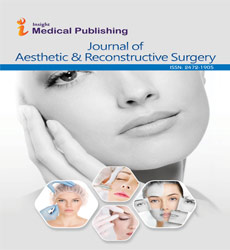The FDA has Approved a Choice Tool for Breast Reconstruction Research
MassimoMongardini*
DOI10.36648/2472-1905.21.7.26
Massimo Mongardini*
Surgical Science Department, University of Rome, Italy
- *Corresponding Author:
- Massimo M
Veterinary Research Division
Surgical Science Department
University of Rome, Italy
E-mail: massmon@unirome.it
Received Date: March 13, 2021; Accepted Date: March 16, 2021; Published Date: March 23, 2021
Citation: Massimo M (2021) The FDA has Approved a Choice Tool for Breast Reconstru ction Research. J Aesthet Reconstr Surg Vol.7 No.2:26.
Editorial
The US Food and Drug Administration (FDA) has certified the BREAST-Q Reconstruction Module as a medical device development tool (MDDT) to help sponsors and scientists develop feasibility, pivotal, and post approval studies of medical devices used in breast reconstruction. According to the announcement, “an MDDT is scientifically validated and can be qualified for use in device evaluation and to support regulatory decision making.” Its use is voluntary. The ageny 's ongoing efforts to monitor and address serious side effec ts associated with silicone breast implants include the qualification of the module.
“For decades, the FDA has meticulously monitored adverse events associated with breast implants and has worked to better understand the quality of life and satisfaction a breast reconstruction patient may experience in order to refine our evaluation of breast implant benefits and risks,” says the FDA. Binita Ashar, MD, is the director of the Center for Diffusion Medicine's Office of Surgical and Infection Control Devices. Physical Well Being (Chest), Psy chosocial Well-Being, Sexual Well-Being, and Satisfaction with Breasts are among the scales included in the tool. The scales are designed to measure a patient's overall quality of life and satisfaction with their breast reconstruction surgery. The FDA also released updated information on breast implant-associated anaplastic large cell lymphoma (BIA-ALCL) and the pattern of systemic symptoms known as "breast implant disease" or BII, which some patients experience after the implant is removed.
According to the update, there were 733 cases of BIAALCL reported to the FDA through 5 January, with 36 deaths – an increase of 160 cases and three deaths since the data was last released in July 2019. There were 733 cases in total, with 620 involving Allergan implants and 47 involving unknown suppliers. Nearly 500 of the cases (496) involved textured implants, while 209 did not.
“While the term ‘breast implant illness' is rarely used in medical literature, symptoms such as fatigue, memory loss, rash, ‘brain fog,' and joint pain may be linked to breast implants, and some patients and clinicians may use the term ‘breast implant illness' to describe these symptoms or use these terms when reporting them to the FDA,” the FDA said.
Open Access Journals
- Aquaculture & Veterinary Science
- Chemistry & Chemical Sciences
- Clinical Sciences
- Engineering
- General Science
- Genetics & Molecular Biology
- Health Care & Nursing
- Immunology & Microbiology
- Materials Science
- Mathematics & Physics
- Medical Sciences
- Neurology & Psychiatry
- Oncology & Cancer Science
- Pharmaceutical Sciences
